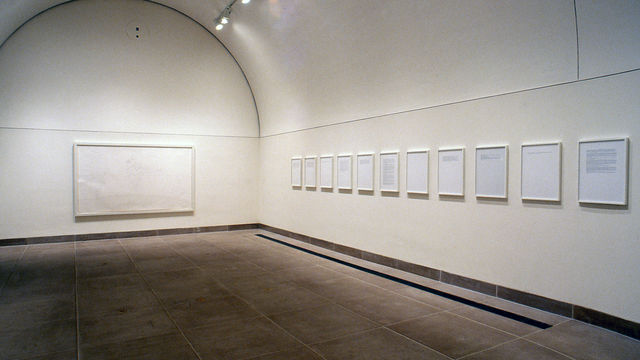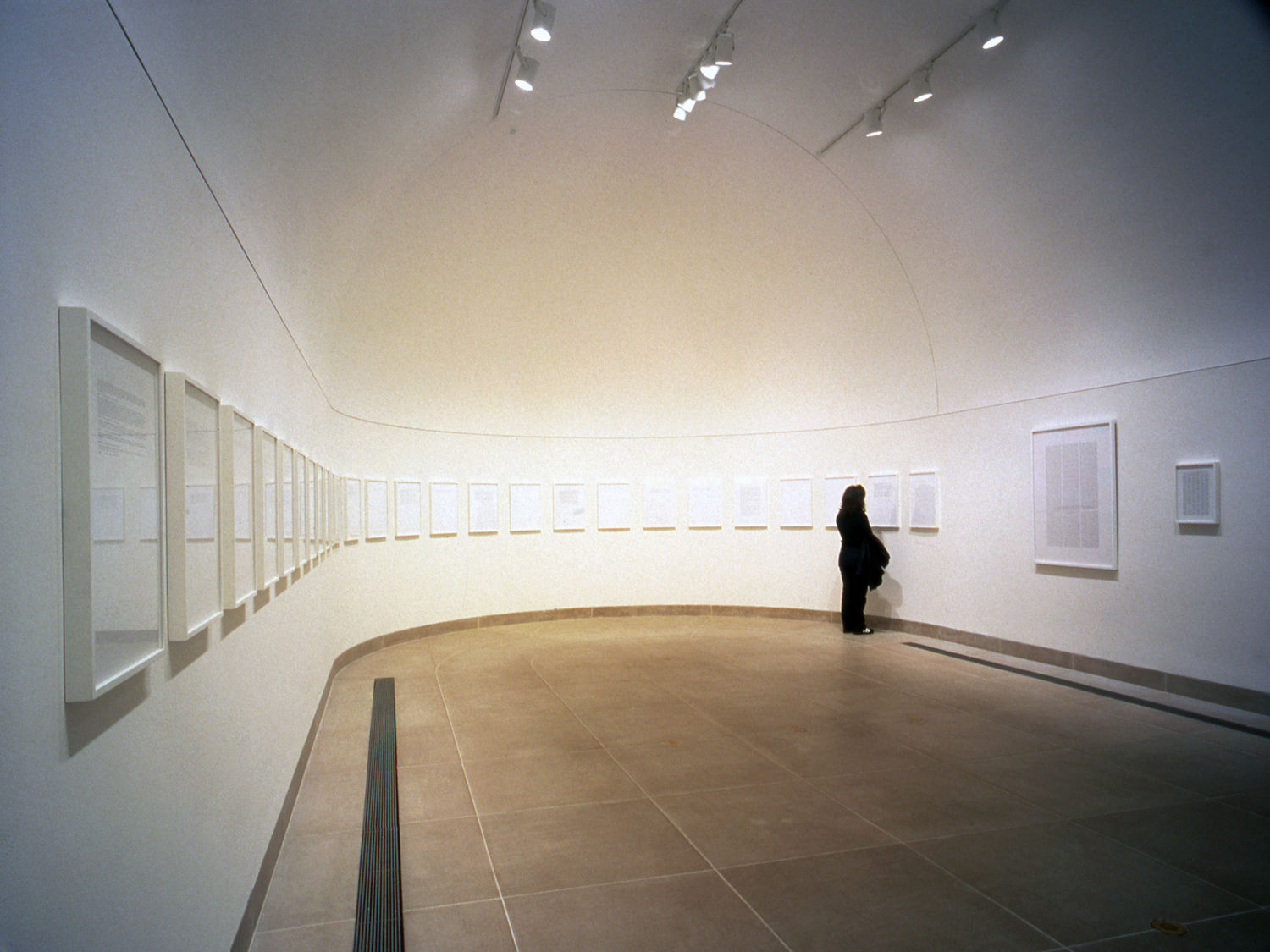
Hammer Projects: Emma Kay
- – This is a past exhibition
Emma Kay confronts us with our culture's desire to pinpoint an individual who can embody and authenticate the ideal of encyclopedic knowledge. Highlighting the effort and absurdity of flexing the mind muscle, she discloses the humor and beauty of its inescapable limitations. She explores the capacity to retrieve knowledge from memory in works like Shakespeare from Memory and The Future from Memory in order to address the fantasy of the human capacity to acquire universal knowledge.
Biography
Emma Kay was born in 1961. She lives and works in London. She received a B.F.A in 1983 and an M.F.A. in 1997 from Goldsmiths College in London. She has had recent solo exhibitions at The approach and Chisenhale Gallery in London. In the United States, her work has been included in group exhibitions at the Contemporary Arts Museum in Houston and the Yerba Buena Center for the Arts in San Francisco. This is Kay’s first solo exhibition in the United States.

Essay
By Jan Verwoert
When it comes to the capacity to retrieve knowledge from memory, our culture sets a high standard. Although we are surrounded by an ever-growing number of libraries, archives, and digital databanks, the brute exercise of the mind is still, paradoxically, rated as a key aspect of cultural competence. We have numerous ways of testing and measuring an individual’s ‘memory performance’: from memory training and recall tests to quiz shows. We seem obsessed with chasing the phantom of a master "memory performer" who actually embodies the ideal of encyclopedic knowledge. TV audiences marvel at child prodigies regurgitating complex number sequences from memory. The face of the first man to win the Who Wants to Be a Millionaire blockbuster quiz show was on the front page of every newspaper. When world chess champion Gary Kasparov fought (and lost) against the IBM chess computer Deep Blue in 1997, he set the classic example of a heroic human memory performer competing with a digital database. As the effort of exercising one’s mind is made more and more redundant by the accessibility and omnipresence of storage technologies, our culture clings to the fantasy of the human capacity to acquire universal knowledge.
It is in this cultural arena, where exercises of personal memory performance compete with fictions of total recall, that Emma Kay situates her conceptual projects. She conducts the experiments which take the paradoxical standards of our culture for real by carrying out personal memory performances in which she deliberately disconnects herself from available archives: in The Bible from Memory (1997) she chose to write down the content of the Bible without any recourse to the Bible itself or other reference material, relying solely on her memory. The summary is presented in a factual style as a simple text piece. The account, rendered in approximately sixty paragraphs on a single page, is visibly incomplete. In Shakespeare from Memory (1998), she reconstructed all twenty-six of Shakespeare’s plays. Employing a typeface conventionally used for film scripts, she gave a short synopsis of each play on a sheet of paper enclosed in a simple white frame. Most of the synopses contain fragmentary plot lines and quotes, but for some of the plays she could recall only the title. In these cases the rest of the page remains blank.
Both the Bible and the collected works of Shakespeare are ‘meta-texts’ that stand as tokens for an ideal of encyclopedic knowledge and radiate the aura of their status as cornerstones of a global cultural heritage. As Kay confronts these universal texts with her own fragmentary versions, she exposes the rift between the performance of personal memory and the vast body of collective knowledge contained in these monumental records of civilization. This rift manifests itself in the gaps in her knowledge. By presenting these gaps as a constitutive component of her work, she emphasizes the fact that the inadequacy of personal memory must not be seen as an individual failure–a bias perpetuated by all recall tests and quiz shows–but as a structural feature of the way memory works. Personal memory performances inevitably fail to meet the imaginary standards set by a culture whose history is built on an immense labyrinth of archives, libraries, and databases.
While studying Kay’s memory pieces, you inevitably identify with her task. As you enter into a dialogue with the work, you start to probe your own memory and compare her results with your own. In this regard, The World from Memory II (1998) is especially inviting. This pencil drawing of all the countries and continents of the globe is beautifully accurate in its inaccuracy. Would you know the names of all the islands of the Caribbean? Or be able to describe the exact location of the Balkan states? As you stand there frowning at weird details on the map, you can’t help smiling at all the things you assured yourself (and others) you knew, when of course you didn’t.
In Worldview (1999), Kay expands her memory project to an epic dimension. Worldview is a history of the world from the Big Bang to New Year’s Eve 2000, retold in columns of minute text on a printout the size of a panoramic painting. When you look at this work from a certain distance, the lines and paragraphs begin to blur into something approximating a monochrome surface. Thus a text that aims to grasp the universal (in terms of encyclopedic knowledge) is presented as a visual equivalent of monochrome painting–a genre best known for its aspiration toward the sublime. On the one hand, Worldview highlights the performative qualities of Kay’s extensive recall exercise, as the vast amount of text documents the effort and duration of writing. On the other hand, the piece playfully invokes the sublime as a means of visualizing the romantic desire inherent in the quest for infinite recall. Kay’s projects might seem quixotic, but this is only because she actually takes on the impossible task set by our culture: to embody, personalize, and authenticate the operation of memory, and at the same time master the totality of encyclopedic knowledge. By acting out these contradictory ideals, she shows that it is only when we take the normative fictions of our culture for real that their discrepancies become manifest.
Kay’s most recent work, The Future from Memory (2001), is a projection in which a digitally animated text scrolls across a white screen. As in the Star Wars opening credits, paragraphs come into view and recede into a distant vanishing point. The text is an account of how human society will evolve in the coming millennia. Despite its epic format, the description is rendered in a factual tone. In the future progress centers around new technologies of communication and production. Transmigration allows for the transfer of a person’s consciousness into the bodies of other people or even animals. Transplant technology helps to extend the average life span to around 120 years. In the twenty-third century nanotechnology is perfected. Every substance can now be generated by recycling basic cellular material. Since the constitution of the planet is rapidly deteriorating, life is possible only in secluded bio-spheres or interstellar settlements. Major problems are caused by mutant viruses, mind-jacking, nanoterrorism, and the first global nuclear meltdown in 2181. By the end of the 38900s the sun starts to darken and life on earth dies. Thanks to the heat produced by a nearby supernova, however, life on the dead planet earth begins to stir again. It rains for a thousand years, and the projection loop starts anew.
In her projects to date, Kay herself is always more or less identifiable as the narrator of her texts. Her familiarity with a subject like Shakespeare communicates a lot about her background and education. In Worldview it is apparent that, from the mid-1960s onward, the writing of history has been tinged with a strong biographical perspective (also emphasized by the fact that the first half of the history of the world leads up to the 1960s, while the second half recounts the events that followed). In The Future from Memory, however, Kay gives a new, hyperbolic spin to the concept of total recall as the position of the narrator subtly shifts from a recognizable personal perspective to that of an impersonal, omniscient observer. By inventing a narrator who recollects millennium after millennium of the future as if it were his or her past, she fictionalizes the subject of memory and launches this fiction into overdrive. An uncanny atmosphere prevails as the viewer is haunted by the question: who is speaking? The ominous, impersonal narrator of this history of the future is the embodiment of encyclopedic knowledge, a superintelligence that resides outside space and time and witnesses the death and rebirth of the planet. So Emma Kay dares to take our culture’s fantasy of infinite memory seriously and presents us with a subject actually capable of total recall: an uncanny specter from another dimension. By acting out the role of a model memory performer, she confronts us with our culture’s desire to pinpoint an individual who can embody and authenticate the ideal of encyclopedic knowledge. Highlighting the effort and absurdity of flexing the mind muscle, she discloses the humor and beauty of its inescapable limitations.
Jan Verwoert is an art critic who lives in Hamburg. He is a contributor to Frieze, Springerin, Afterall, and Camera Austria.
Hammer Projects are made possible by The Horace W. Goldsmith Foundation and The Andy Warhol Foundation for the Visual Arts. Additional support is provided by the Los Angeles County Arts Commission and Peter Norton Family Foundation.


